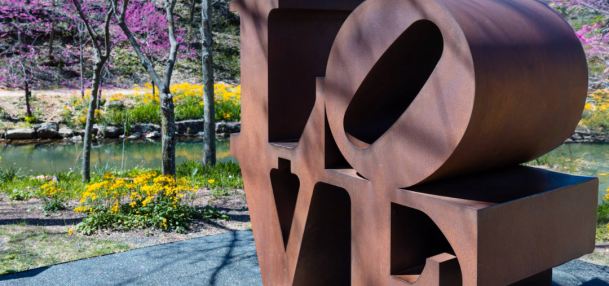Edwards says a major goal for the project, funded by grants from the Walton Family Foundation, Wendy Guerrero has a clear vision for what she wants to show at the Bentonville Film Festival.
As the president of programming for the upcoming festival in downtown Bentonville, she seeks films featuring people from all backgrounds. “We’re trying to represent the entire population,” she says. The team of selectors, who use screeners to help them, use specific criteria to choose the festival’s films from hundreds of submissions. First, the movie needs to have “a writer, director, producer who is female or diverse,” Guerrero says. Diversity includes differing sexual orientation, gender identity, religion, race, ethnicity or ability. “People with disabilities are really championed this year at the festival. We have a number of films that represent that.”
The screeners then give each film a couple of scores. One is based on how well the film meets diversity criteria. The other reflects how much the screener enjoyed the movie. Wendy Guerrero is especially excited about a group of films making their world premieres at the fifth annual Bentonville Film Festival on May 7-11.
They include stories about a gun-wielding Native American woman and an educator who helps finance quinceañeras for poor Hispanic girls. She can’t wait to hear what kinds of questions come from audiences during the panel discussions after these movies’ world premieres, and what kind of collaborations could develop. Some moviemakers who met past Bentonville film festivals, for instance, have teamed up and made movies of their own. “That’s the kind of thing that gives me goosebumps,” Guerrero says.
More than most movie festivals, the Bentonville Film Festival champions people who cross social and ethnic boundaries, heroes who don’t fit neatly in one category or another. That’s especially important for Guerrero, given her own story.
***
Wendy Guerrero grew up in the 1980s and 1990s in Santa Maria, a scenic, Southern California wine country town in which the movie “Sideways” was filmed.
Her father, now deceased, was Mexican. Her mother is English. They didn’t look like each other, nor did their daughter’s skin complexion match their own. “My father looked very Mexican — dark eyes, dark skin, dark hair — while my mother’s very white with white skin, green eyes, blond hair. There were definitely moments where people didn’t believe that my dad was my dad.”
This was especially true after school when Guerrero’s father arrived to pick her up. Her classmates often questioned his relation to her. “I would be like ‘That’s my dad,’ and they would be like ‘That’s not your dad.’ I would get so confused,” recalls Guerrero, one of three children. “It’s tough on a kid when you’re getting people asking questions about your parents or what they look like.”
“It just opens up this whole other question that you’re constantly struggling with.”
Later in life, Guerrero moved to bigger cities like San Francisco, New York and Los Angeles. She attended acting school and wrote and performed in plays centered on female characters on Off-Off Broadway. But issues involving racial identity still beleaguered her.
In Los Angeles, as a young actress, classmates no longer questioned her. This time around, it was potential employers.
“When I was auditioning my look wasn’t right for what television networks were looking for.” They sought “cookie cutter types,” she recalls. “Either you looked All-American or you looked like an immigrant.” She tried and tried, but couldn’t get the parts she wanted. “They were like ‘You’re great. We just don’t know how to cast you, because you could look American or European. I think they felt there were too many options.”
For years, it seemed straddling two worlds as neither Mexican nor “white” was a negative for Guerrero. That’s changing, however.
In Los Angeles, Guerrero stepped away from acting and formed a production company with long-time business partner Bruce Dern. That company, Publicly Private, highlights stories of females and minorities. Guerrero became known in the industry as someone who speaks up for historically marginalized voices. That’s why, in 2014, the co-founder of the Bentonville Film Festival reached out to her.
As the head of a faith and family entertainment company, Trevor Drinkwater was a long-time supplier to Walmart executive and senior movie buyer, Louis Greth. After prompting from company higher-ups, Greth asked Drinkwater if a film festival based on diversity could work in Bentonville, home to Walmart’s world headquarters. Drinkwater discussed the idea with his friend, Geena Davis, the actress and activist who founded the Geena Davis Institute on Gender in Media. Its goal is to increase the media presence of female characters aimed at children and to decrease stereotyping of females by the male-dominated industry.
Drinkwater and Davis decided to lay the groundwork for the Bentonville Film Festival. Soon afterward, Drinkwater was introduced to Guerrero through a mutual producer friend. “He needed a diverse representative to potentially talk to Walmart about why it would be so important to have a festival surrounding inclusion,” Guerrero says. She and Drinkwater flew to Bentonville and the festival was “something Walmart got behind right away based on their own initiatives and all of the work that Geena was doing on gender in Hollywood, Guerrero adds.
That first Bentonville visit came in spring of 2014. “I was expecting it be small town that didn’t really have much going on — not a long of great places to eat, not a lot of places to stay,” Guerrero recalls. But the visit opened her eyes. “I really fell in love with it, especially the beauty of this part of the world. Especially in the springtime, with the cherry blossoms blooming and the blue skies and that walk from 21c Museum Hotel to the Crystal Bridges museum.”
Guerrero especially enjoyed the area’s tight-knit community feeling, and how that carried over into the festival’s vibe. “We put everything in a one-mile radius. You can see people you saw at the screening, and now you see them walking up and down the street. You can easily meet them for lunch, or dinner or a drink. It’s just much more of a community” feeling compared to the larger festivals in major, cosmopolitan cities.
She and other festival leaders have made their mission to be showcasing movies made by, and about, females or minorities of any kind. Everybody has a story, after all. But too many without power live in silence. “That’s why we have the festival in a lot of ways — to make sure that there’s exposure that these stories are being represented. That these filmmakers are coming and speaking about their films and telling their stories to audiences, and that there’s still a filmgoer and filmmaker connection to get more of a dialogue going: who these filmmakers are, why it’s important to tell their stories, and to have the audiences who are interested and hungry to hear these stories be able to make those connections with filmmakers.”
The panel discussions are as big a part of the festival as the movies themselves. As the festival gets older, it adds other elements as well. This year, for instance, will see the debut of a filmmakers’ retreat to Eureka Springs. Live performances, too, have gained a foothold.
That’s how Guerrero ran across the subject of her next documentary project: The LatinX Theatre Project.
***
For years, Bentonville resident Ashley Edwards has worked with the Bentonville Film Festival, most recently helping Guerrero as the local programming director.
Her main job is theater professor at Bentonville’s Northwest Arkansas Community College. While there, Edwards founded the LatinX Theatre Project. It’s a group of live performers, mostly in their 20s, who tour the region sharing stories of their lives and heritage through rap, song and spoken word.
Last year, 12 members of the group performed a spoken word piece at the Bentonville Film Festival awards ceremony. “It opened the show and I just became really excited after I saw it,” Guerrero recalls. “I thought it was so energetic and poetic at the same time. The kids are all really talented.”
In fact, Guerrero was so impressed by the performance that she decided to team up with Edwards for a documentary film project in the works on the group. The project, not yet titled, will showcase the group’s performances in the region and a trip to Los Angeles to visit with Guerrero. These performances address “diversity and inclusion and what that means — not just buzz word, but what does it really mean?” Edwards says.
Most of the group’s members are Hispanic students at NWACC. As the children of multi-generational Americans and undocumented immigrants alike, their stories vary. Some have family who have been in Arkansas for decades, while others came to the area from Mexico via California.
oundation, is to showcase performance art as a legitimate career path. “Latinx people a lot of time struggle telling their parents they’re going into art,” she said. “A lot of parents have struggled and want them to do a job they feel will make money.” But there is high demand for the LatinX performers around the state, Edwards notes, which is a good sign for the future market.
Like Guerrero, many of the LatinX performers know the sting of rejection based on looks. Edwards says a lot of them tried out for roles in their high school plays, but were rejected because they didn’t fit the “white” look desired in those parts. Guerrero, though, has helped create a film festival that gives these performers a major platform where their differences are not just tolerated — but celebrated.
If all goes well, Guerrero adds, a future Bentonville Film Festival will welcome the world premiere of their stories in documentary form as well.
Some Films to Check Out
“Bamboo and Barbed Wire”
A 17-year-old Syrian refugee girl in Idaho pursues her American Dream to become a doctor despite racial prejudices paralleling life stories of Japanese Americans interned during WWII.
Includes George Takei and Ruth Bader Ginsburg.
Showtimes:
Friday May 10th; 3:00 PM - 5:00 PM
Walmart Museum World Room
Saturday May 11th - 12:45 PM - 3:00 PM
Skylight Cinema 4
https://bentonvillefilmfestival.com/artists/bamboo-and-barbed-wire/
“Once Upon a River”
Centers on a 15-year-old girl raised in a riverside cabin amid the wilderness of western Michigan by her Native American father, after her white mother has abandoned them. “Margo is a prodigy with a rifle, an eagle-eyed huntress, who idolizes Annie Oakley, and a stoic loner who guardedly strives to prove herself in a community dominated by men.” - via IndieWire
Showtimes:
[World premiere]
Friday May 10th - 4:00 PM - 6:00 PM
Skylight Cinema 1
Saturday May 11th - 10:00 AM - 12:00 PM
Skylight Cinema 3
https://bentonvillefilmfestival.com/artists/once-upon-a-river/
“Our Quinceañera”
A high school principal in a small town in Texas hosts a yearly Quinceañera for students that can't afford it. The entire border town San Benito, TX gets together to teach these girls that with the power of community any dream can come true.
Showtimes:
[World premiere]
Friday May 10th - 1:00 PM - 2:30 PM
Walmart Museum World Room
Saturday May 11th - 10:15 AM - 12:15 PM
Skylight Cinema 4
https://bentonvillefilmfestival.com/artists/our-quinceanera/
Go to the festival schedule for more
https://bentonvillefilmfestival.com/schedule/













